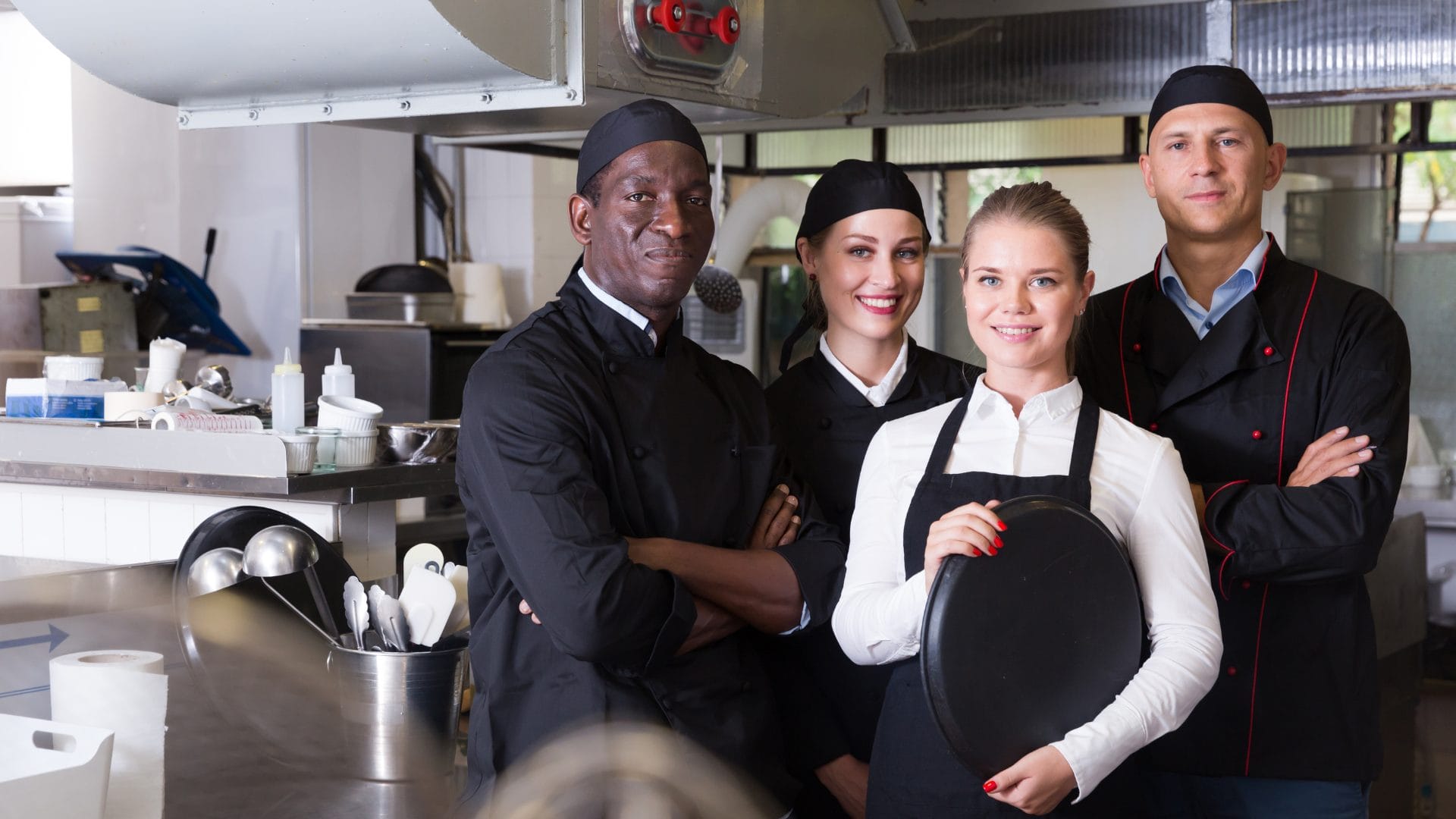To help aspiring and established Kitchen Managers optimize kitchen processes and improve operational efficiency, we’ve created the below guide with essential tips on how to be a successful Kitchen Manager.
What Is Kitchen Management?
Kitchen management refers to the process of managing all the back-of-the-house operations. It typically involves:
- Ensuring the smooth and uninterrupted kitchen workflow
- Maintaining the consistency of food quality
- Keeping the kitchen environment clean and sanitary
- Managing the kitchen staff and schedule
- Conducting menu planning and development
- Managing inventory for kitchen-related supplies and equipment
While not all kitchens operate the same way, successful Kitchen Managers will be masters of the above points.
What Does a Kitchen Manager Do?
A Kitchen Manager, also called a Kitchen Supervisor, Kitchen Director or a Culinary Lead, is an individual who streamlines and oversees the back-of-the house operations in a restaurant, bar, hotel or similar establishments.
While not all Kitchen Manager duties are the same across establishments, some of the common duties are:
- Hiring, training and disciplining kitchen employees such as Dishwashers and Cooks
- Handling back-of-house inventory
- Overseeing food preparation and other kitchen operations
- Upholding the cleanliness and safety standards
- Scheduling staff
- Managing the kitchen budget
- Establishing standards for performance and customer service
Given the numerous obligations, learning how to be a better Kitchen Manager involves leveraging effective strategies to stay on top of these demands. Let’s explore seven practical tips to help you excel in this role.
9 Tips for Being an Effective Kitchen Manager
Explore our list of essential tips on how to be a good Kitchen Manager below:
1. Master inventory management
Inventory includes all the ingredients a kitchen may need to produce a dish, along with wine, spirits and beverages that accompany them. Successful Kitchen Managers are those who manage to minimize waste and ensure that there’s always enough (and never too much!) of a particular item.
Considering that 58% of U.S. restaurant operators said that their main concern is the high inventory cost, mastering inventory management is crucial to running an efficient kitchen and restaurant. To effectively conduct inventory management, you want to define the minimum stock of an item before you reorder. This will help you minimize waste by not ordering too much of an item, and it will also prevent you from running out of an item unexpectedly.

[Source: Restaurant Dive]
You also want to include the appropriate storing methods for each product: make sure to keep the items that need to be refrigerated or frozen at the correct temperatures, and store dry goods in a cool, dry place. Finally, you should practice the FIFO method. It refers to the first-in-first-out method that will help you reduce the amount of food that has gone bad and ends up being wasted.
2. Motivate your team
No kitchen can function at its best without a strong leader and a dedicated crew. To be a successful Kitchen Manager, creating a positive work environment is crucial for maintaining high morale and delivering exceptional customer service. As a team leader, it’s your responsibility to make the team feel valued and appreciated.
Considering that more than half (53%) of employees say that they would have stayed longer at a job if they felt more appreciated, keeping morale high is essential to continually running a successful kitchen without a high turnover rate.
Here are just a couple of ideas you can use to improve the atmosphere in the kitchen:
- Celebrate individual and team successes to boost morale and encourage continued excellence.
- Offer regular, actionable feedback to help staff improve and feel valued in their roles.
- Create an environment where team members feel comfortable sharing ideas and concerns.
3. Optimize kitchen operations
Optimizing a kitchen can refer to two different things:
- Adjusting the kitchen layout for improved efficiency when preparing dishes
- Clearly defining the duties and responsibilities for each member of the kitchen staff
So, when designing the kitchen layout, consider separating different prep and cooking zones as much as possible within the kitchen to prevent cross-contamination.
To ensure that all members of the kitchen staff can work together seamlessly, clearly outline each person’s duties and responsibilities. This helps to minimize confusion and overlap, ensuring that every team member knows exactly what is expected of them. Additionally:
- Implement kitchen management software to track orders, manage inventory, and schedule staff efficiently.
- Ensure all dishes are prepared consistently by maintaining detailed recipe guides accessible to all kitchen staff.
- Regularly assess key performance indicators such as food cost percentage, preparation times, and customer feedback to identify areas for improvement.

4. Establish kitchen and equipment cleaning protocols
One of the main responsibilities of a successful Kitchen Manager is to keep the cooking and prepping areas of the kitchen clean. Create checklists through which you can monitor the cleanliness of the kitchen and ensure that all workstations are kept in top-notch, polished condition. Also, consider introducing regular inspection checks to maintain the cleanliness standard and identify areas of improvement.
5. Ensure compliance with health and safety regulations
Maintaining a safe and sanitary kitchen is non-negotiable in the culinary industry.
- Regularly review local health codes and ensure all practices meet or exceed these standards.
- Enforce proper handwashing, use of gloves, and regular sanitation of surfaces to prevent contamination.
- Prepare the team for emergencies by organizing drills and ensuring everyone knows the protocols for accidents.
6. Develop career opportunities for your team
Given that 94% of employees stay longer in companies that provide them with career advancement opportunities, a good Kitchen Manager will come up with ways to develop and progress the careers of their kitchen staff.

7. Implement effective training programs
Training is essential for maintaining high standards and ensuring staff are well-prepared to meet the kitchen’s demands.
- Organize workshops focusing on areas like food safety, new cooking techniques and use of kitchen equipment.
- Allow team members to learn different roles within the kitchen to promote flexibility and team environment.
- Offer materials such as culinary books, online courses, or mentorship opportunities to support continuous learning.
8. Communicate expectations and responsibilities
While each restaurant has different needs and, therefore, requires different roles to be present, some of the common job roles found in a restaurant kitchen include:

A well-functioning kitchen needs to be like a well-oiled machine. Each part needs to do what it is supposed to, or the machine might stop working. Communication is one of the essential skills for all who wonder what it takes to be a good Kitchen Manager. It is your job as a Kitchen Manager to ensure that all team members know exactly what is expected of them.
9. Set an example
Set an example for your team by demonstrating a strong work ethic. By consistently demonstrating a positive attitude, punctuality, high standard of excellence and the ability to stay calm under pressure, you can set the tone for the rest of your team. When they see you leading by example, they are that much more likely to follow suit, creating and nurturing an environment of professionalism and respect in the kitchen.
Conclusion
Mastering the art of kitchen management is more than just overseeing operations – it’s about creating a cohesive, efficient, and motivated team that consistently delivers excellence. A great Kitchen Manager balances culinary skills with leadership, ensuring smooth workflows, satisfied staff, and ultimately, happy customers.
FAQs About How To Be a Good Kitchen Manager
No, Kitchen Managers don’t have to be Chefs. While having culinary experience can be a plus, a Kitchen Manager’s job is more focused on the operational and business side of the kitchen and less on food preparation.
Some of the essential Kitchen Managers skills include:
- Communication
- Attention to detail
- Team management
- Organization
- Time management
- Financial and inventory management
Most common problems that plague the hospitality industry and its kitchens in general include:
- Staffing shortages
- Inventory management difficulties
- Equipment failures
- Communication issues
- Food safety and hygiene
- Stress and burnout
A Kitchen Manager collaborates in menu planning by considering seasonal ingredients, customer preferences, and cost factors to create appealing and profitable menu items.
Best practices include providing comprehensive onboarding, continuous skill development opportunities, clear communication of expectations, and constructive feedback to ensure staff are competent and confident in their roles.
A Kitchen Manager contributes to customer satisfaction by ensuring high-quality food, maintaining efficient kitchen operations, and collaborating with front-of-house staff to deliver a seamless dining experience.

Written by Vukasin Petrovic
Vukasin is an experienced content creator with more than five years of writing and editing experience. With a background in English and an MFA in Creative Writing, he excels in digital marketing and copywriting, crafting narratives that engage the audience.

Reviewed by Marcy Miniano
Marcy is an editor and writer with a background in public relations and brand marketing. Throughout her nearly decade-long career, she has honed her skills in crafting content and helping build brands across various industries — including restaurant and hospitality, travel, tech, fashion and entertainment.




